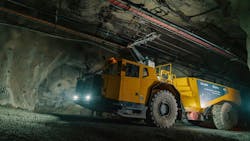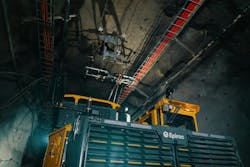This Week in Power & Motion: Epiroc Creates Fully Electric Trolley System for Underground Mining
There is much going on in the world of hydraulic, pneumatic and electric motion systems, from technology introductions and industry advancements to new trends and industry leaders. Each week the Power & Motion team collects the latest industry news to help keep our readers up to date on what's happening in the fluid power and electric motion control sectors as well as the industries they serve.
NFPA Seeks Input on AI Initiatives
The National Fluid Power Association (NFPA) is looking for input from the hydraulics and pneumatics industry on ways it can help members to better understand and work with artificial intelligence (AI).
By taking a brief survey, NFPA aims to get perspective on how it should prioritize its AI initiatives to create a framework that will aid the industry through educational opportunities and more.
The information will also help level set where the fluid power industry is currently at with its use of AI. Ways the association notes AI can be practically applied by its members include:
- Building a complex quote from a provided list
- Scheduling deliveries and truck loading sequence
- AI-driven product recommender lists
- Evaluating incoming leads
- Expediting delayed shipments
As part of its efforts to educate the industry on AI, there will be a session during NFPA's Industry & Economic Outlook Conference in August 2024 entitled "Application of AI Technologies in Industrial Companies" led by Mike Marks of Indian River Consulting Group. During this session he will provide an overview of AI, guidance on where to start on your AI initiatives and more.
READ MORE: Assessing Future Design Needs for Hydraulics and Pneumatics
Beckhoff Opens New Offices in U.S.
Beckhoff Automation has opened a new office in Austin, TX, and relocated its Chicago office to an expanded space. Both will help increase support to customers in these regions.
According to the company, the new 3,500 sq. ft. facility in Austin will provide a site for local sales and application engineering to support a growing customer base in the Southwest region of the U.S. And because the city is a hub for advanced technology industries, such as battery manufacturing, Beckhoff sees a range of opportunities to provide its automation solutions.
"Austin is becoming one of Beckhoff USA’s fastest growing markets," said Sixto Moralez, Regional Manager – South at Beckhoff Automation LLC. "We’ve seen a 5-year compound annual growth rate (CAGR) of about 15% largely due to the area’s focus on disruptive tech. Austin’s rising industries include everything from medical devices and lab automation to EV and battery production, with major activity in process automation and digital manufacturing. The innovators in these industries are embracing our breakthrough technologies, so the Austin office is a great addition to accelerate growth within the region."
Beckhoff has also relocated its Chicago office to a 4,800 sq. ft. facility in Rosemont, IL, which provides close proximity to O'Hare International Airport. This will make it easy to host customers and training events at the facility while also offering access to the greater Chicago area. The surrounding area has provided many growth opportunities to the company which it anticipates will continue.
The company is also planning to open new facilities in Los Angeles and Atlanta in 2024 to further enhance its ability to serve customers around the U.S.
FieldComm and FDT Merge to Harmonize Control Systems and Protocols
FieldComm Group, a global standards-based organization for integrating digital devices, and FDT Group, a non-profit focused on open standards for automation systems, are combining to create a single business aimed at advancing integration technology and harmonizing control system applications across multiple protocol topologies for process and factory automation.
Existing technologies from the two entitites will continue to be supported, and FieldComm Group will acquire all FDT technology and resources. An independent Strategic Integration Committee will be formed to guide future directions for protocol-independent device integration technologies.
The goal of bringing the two group's together is to streamline process automation and factory manufacturing device management in an effort to enhance interoperability throughout the industry. With the newly formed Strategic Integration Committee, there will be a focus on creating a protocol-agnostic device integration approach which will foster alliances with major field protocol organizations, including CC-Link Partner Association, EtherCAT Technology Group, FieldComm Group, ODVA, OPC Foundation, Modbus, Profibus/Profinet International, and others.
Overall, this will help to improve engineering efficiency, plant uptime, and user satisfaction across various industrial automation fields. Within this strategic committee, cutting-edge technologies, tools, and certifications will streamline cost-effective adoption for members while providing a single device package compatible with any operating system that will enable effortless data access from field devices to cloud, edge, and mobile applications.
Volvo Increasing North American Truck Production
Volvo Group has announced plans to build a new manufacturing plant in Mexico for production of its heavy-duty trucks. The new facility will support growth plans for both the Volvo Trucks and Mack Trucks brands in the North American market.
The company has also made investments in its production facilities in Pennsylvania and Virginia to expand capacity, demonstrating the continued growth opportunities it sees in the North American market.
Volvo Group's new plant in Mexico will provide approximately 1.7 million sq. ft. of space and will be dedicated to production of conventional heavy-duty trucks. According to the company, this new facility will provide logistical efficiencies to support customers in the southwestern/western regions of the U.S., as well as Mexico and Latin America. Manufacturing products for the region in the region like this is a continually growing trend among manufacturers of all types to improve supply chains.
And the building of new manufacturing facilities, as well as optimism for the trucking market, will benefit the fluid power and electric motion control sectors whose products are used in the vehicles as well as the machines which produce them.
READ MORE: Nearshoring Gains Attention as Supply Chain Issues Linger
Epiroc and Industry Partners Create Battery-Electric Trolley System for Underground Mining
Mining equipment manufacturer Epiroc has collaborated with Boliden and ABB to deploy what is considered the first fully battery-electric trolley truck system in an underground mine. The test track is 800 m long with a 13% incline and is a step toward creating an all-electric mine.
Electrification in mining — a key customer market for fluid power — continues to grow to help curb emissions and increase safety for workers, especially in underground operations due to the confined working environment. The industry is also being taskes with increasing output for critical materials while reducing its energy use.
Mining company Boliden plans to implement a full scale, autonomous electric-trolley system in one of its mines in Sweden where four Epiroc MT42 SG Trolley trucks will operate 750 m underground. This will help to reduce emissions as well as noise and vibration within the mine.
The Epiroc battery-electric mine trucks are equipped with dynamic charging capabilities while ABB's DC converter, HES880 inverter and AMXE motors to enhance the power of the trolley system. Per Epiroc, the electric trolley line gives additional assistance to the battery-electric mine truck on the most demanding stretches up-ramp while fully loaded, enabling further reach and battery regeneration during drift, helping to increase productivity.
"Together, in close partnerships we can accelerate the transformation and reach a steep curve in mining technology innovation like we have done in Kristineberg," said Wayne Symes, President Epiroc Underground division. "In a short space of time, we have implemented and delivered technology to not only reduce CO2 emissions, but substantially extend travel distance for battery-electric driven vehicles on heavy ramp haulage, reduce operating costs, and improve the health and safety of mining environments."
READ MORE: The Impacts of Electrification on Fluid Power Systems
About the Author
Sara Jensen
Executive Editor, Power & Motion
Sara Jensen is executive editor of Power & Motion, directing expanded coverage into the modern fluid power space, as well as mechatronic and smart technologies. She has over 15 years of publishing experience. Prior to Power & Motion she spent 11 years with a trade publication for engineers of heavy-duty equipment, the last 3 of which were as the editor and brand lead. Over the course of her time in the B2B industry, Sara has gained an extensive knowledge of various heavy-duty equipment industries — including construction, agriculture, mining and on-road trucks —along with the systems and market trends which impact them such as fluid power and electronic motion control technologies.
You can follow Sara and Power & Motion via the following social media handles:
X (formerly Twitter): @TechnlgyEditor and @PowerMotionTech
LinkedIn: @SaraJensen and @Power&Motion
Facebook: @PowerMotionTech




